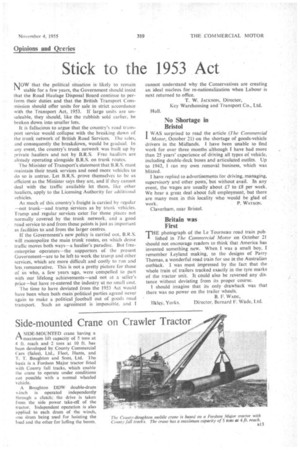Opinions and Queries
Page 39

If you've noticed an error in this article please click here to report it so we can fix it.
Stick to the 1953 Act
NOW that the political situation is likely to remain stable for a few years, the Government should insist that the Road Haulage Disposal Board continue to perform their duties and that the British Transport Commission should offer units for sale in strict accordance with the Transport Act, 1953. If large units are unsaleable, they should, like the rubbish sold earlier, be broken down into smaller lots.
It is fallacious to argue that the country's road transport Service would collapse with the breaking down of the trunk network of British Road Services. The sales, and consequently the breakdown, would be gradual. In any event, the country's trunk network was built up by private hauliers and not by B.R.S. Free hauliers are already operating alongside B.R.S. on trunk routes.
The Minister of Transport's statement that 13.R.S. must maintain their trunk services and need more vehicles to do so is untrue. Let B.R.S. prove themselves to be as efficient as the Minister says they are, and if they cannot deal with the traffic available let them, like other hauliers, apply to the Licensing Authority for additional vehicles.
As much of this country's freight is carried by regular —not trunk—and tramp_ services as by trunk vehicles. Tramp and regular services cater for those places not normally covered by the trunk network, and a good road service to and from those points is just as important as facilities to and from the larger centres.
If the Government's new policy is carried out, B.R.S. will monopolize the main trunk routes, on which dense traffic moves both ways—a haulier's paradise. But freecnterphise operators—the supporters of the present Government—are to be left to work the tramp and other services, which are more difficult and costly to run and less remunerative. This is not a pretty picture for those of us who, a few years 'ago, were compelled to part with our lifelong achievements—and not at a seller's price—but have re-entered the industry at no small cost.
The time to have deviated from the 1953 Act would have been when both main political parties agreed never again to make a political .football out of goods road transport. Such an agreement is impossible, and I
cannot understand why the Conservatives are creating an ideal nucleus for re-nationalization when Labour-is next returned to office.
T. W. JACKSON, Director,
Key Warehousing and Transport Co., Ltd.
Hull.
No Shortage in Bristol
I WAS surprised to read the article (The Commercial I Motor, October 21) on the shortage of goods-vehicle drivers in the Midlands. I have been unable to find work for over three months although I have had more than 25 years' experience of driving all types of vehicle, including double-deck buses and articulated outfits. Up to 1942, f ran my own removal business, which was blitzed.
I have replied to advertisements for driving, managing, supervisory and other posts; but without avail. In any event, the wages are usually about E7 to £8 per week. We hear a great deal about full employment, but there are many men in this locality who would be glad of
work. P. WATSON. Claverham, near Bristol.
Britain was First
THE photograph of the Le Tourneau road train pub lished in The Commercial Motor on October 21 should not encourage readers to think that America has invented something new. When I was a small boy, I remember Leyland making, to the designs of Parry Thomas, a wonderful road train for use in the Australian outback. I was most impressed by the fact that the whole train of trailers tracked exactly in the tyre marks of the tractor unit. It could also be reversed any distance without deviating from its proper course.
I should imagine that its only drawback was that there was no power on the trailer wheels.
B. F. WADE,
'Ilkley, Yorks. Director, Bernard F. Wade, Ltd.




















































































